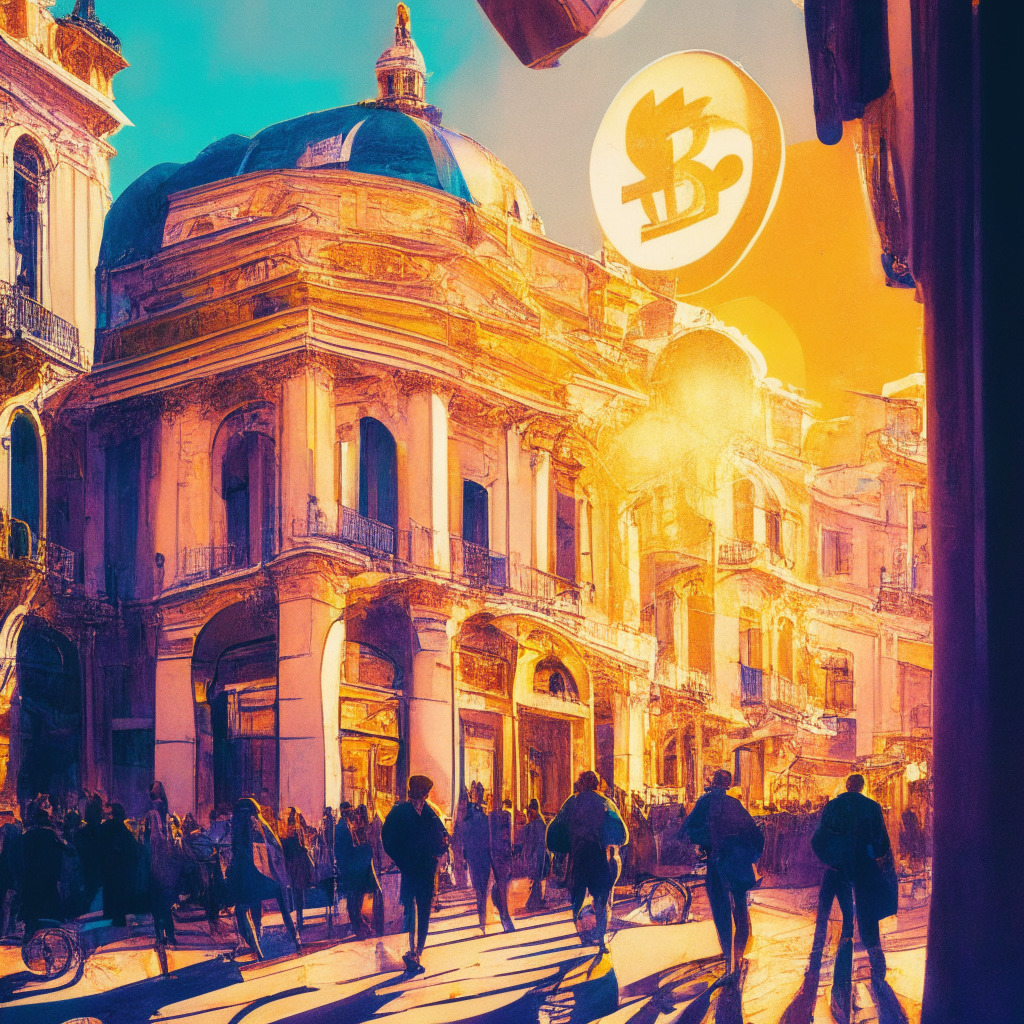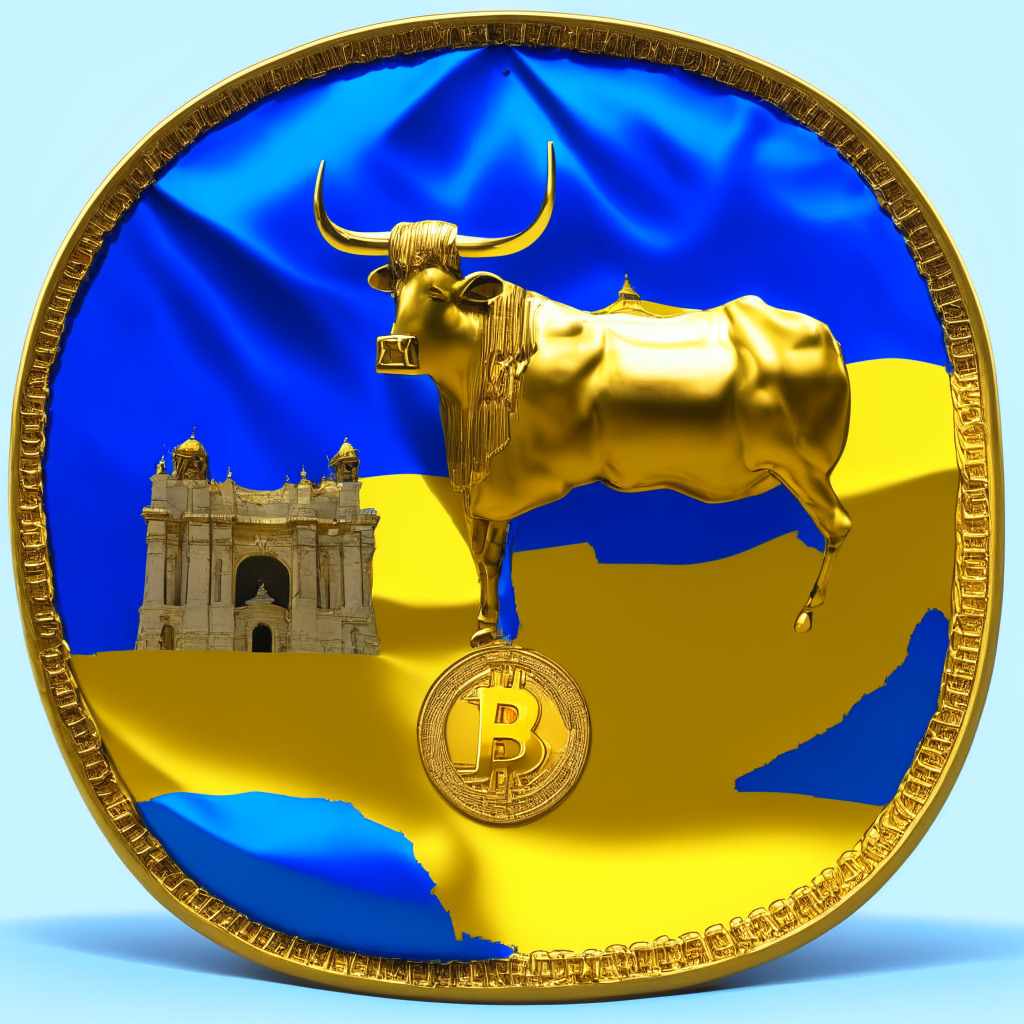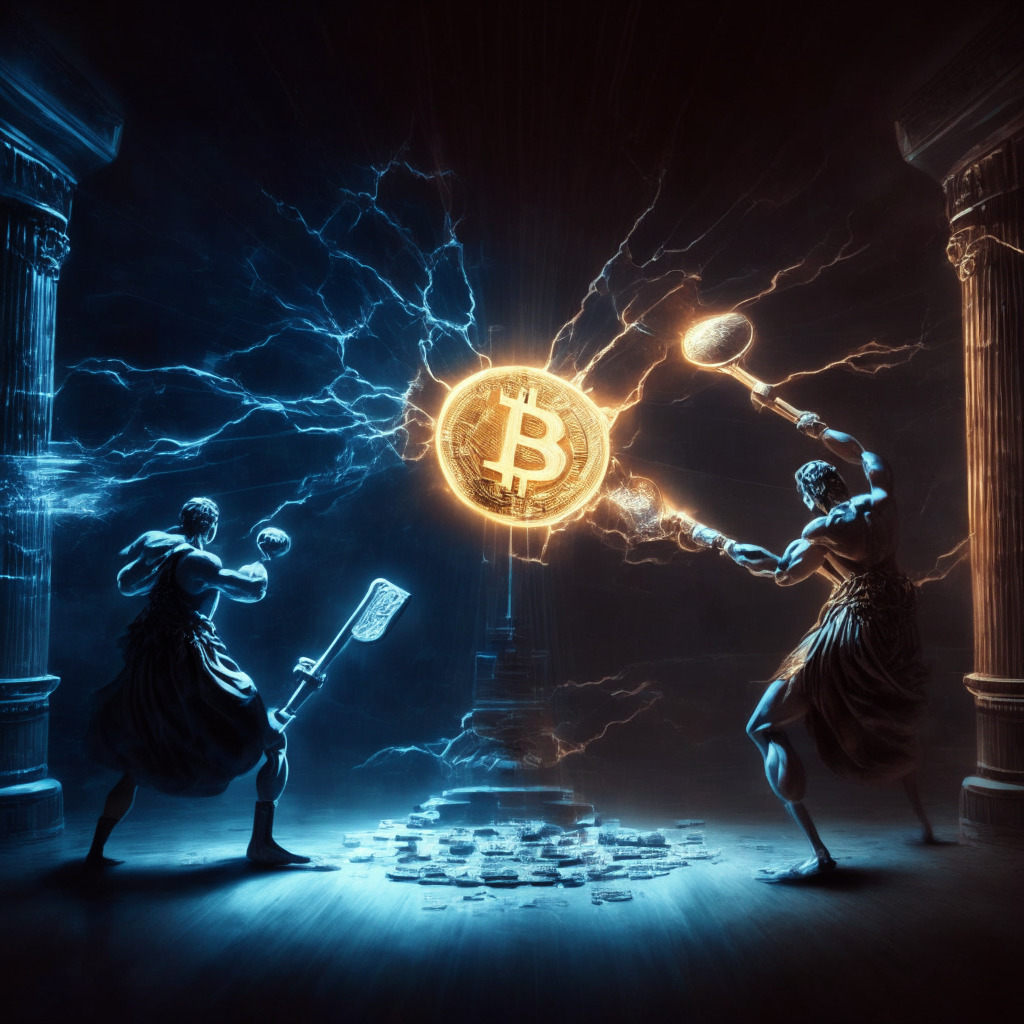The SEC accuses Coinbase of non-compliance in the registration as a securities exchange, an accusation Coinbase counters by declaring cryptocurrency transactions don’t resemble traditional investment contracts. The lawsuit’s pivot point is the interpretation of the “Howey test” for classifying assets as securities. Coinbase maintains the assets on its platform are not securities and exist outside SEC’s jurisdiction.
Search Results for: Coinbase
Ripple’s Rise in Singapore vs. Coinbase’s Legal Quagmire: Paving the Path for Crypto Regulation
The Monetary Authority of Singapore has awarded Ripple a digital payment tokens license, enhancing its position in the digital asset market. Concurrently, the SEC and Coinbase are engaged in a contentious lawsuit, calling attention to potential hurdles and the urgent need for clear cryptocurrency regulation.
Crypto Regulation Variance: SEC vs Coinbase and Argentina’s Proposed Digital Currency
“The SEC and Coinbase are in court, debating securities registration for crypto assets. Meanwhile, Argentina’s presidential candidates propose differing cryptocurrency solutions to economic issues: introducing a digital currency or supporting Bitcoin and abolishing the central bank.”
Crypto Regulation: Singapore’s Strides Forward with MPI Licenses to GSR Markets and Coinbase
The Monetary Authority of Singapore (MAS) granted GSR Markets, a crypto liquidity provider, a Major Payment Institution license. GSR, like Coinbase, can now provide crypto and fiat-linked services to Singaporean entities and residents, expanding crypto regulation. Despite potential challenges, including transaction irreversibility and crypto’s inherent volatility, Singapore’s balance of fostering innovation while ensuring safety allows over 700 Web3 companies to thrive, indicating a significant crypto future for finance.
Singapore’s Crypto Embrace: Coinbase’s MPI License Triumph and the Double-edged Sword of Security
“Coinbase, the crypto exchange, obtained a Major Payment Institution (MPI) license from Singapore’s Monetary Authority. This approval extends its digital token services in Singapore, augmenting its responsibility towards the expanding crypto and Web3 community. However, potential risks such as hacks, scams, and breaches loom large in the emerging cryptocurrency landscape.”
Coinbase’s Major Step: Securing MPI License under Singapore’s Payment Act
“Crypto exchange Coinbase has secured a full Major Payment Institution license in Singapore, permitting it to expand its crypto payment services. This progress aligns with Coinbase’s global aspirations, while resonating with Singapore’s leading-edge economic approach and regulations. However, the accompanying need for regulatory clarity and risk management is emphasized.”
Expanding Horizons: Ledn’s Ethereum Yield Product & Coinbase’s Regulatory Campaign
Ledn is introducing an Ethereum yield product in response to user demand for simpler staking alternatives. Their new offering is “ring-fenced,” providing a safety layer against bankruptcy. Ledn is also launching a stablecoin Growth Account, though not available in the U.S. or Canada. Meanwhile, Coinbase is seeking clearer crypto regulations, despite skepticism due to political and regulatory concerns.
Coinbase’s Fight for Crypto Regulations: A Brave Campaign or Futile Effort?
“Coinbase CEO, Brian Armstrong, and US crypto entrepreneurs are lobbying Washington for clearer digital currencies rules to simplify regulatory compliance. However, political obstacles and issues like crypto money laundering can hinder the acceptance of these new rules.”
Coinbase Launches Perpetual Futures Trading for Non-US Retail Customers: Risks and Rewards
“Coinbase International announces they will launch perpetual futures trading for non-US retail customers, following additional regulatory approval. This move will allow previously locked-out retail traders access to a market largely controlled by institutions, potentially leveling the playing field.”
Coinbase’s Expansion Emphasizes Need for International Crypto Regulations
Coinbase, a leading US-based crypto exchange, has secured approval from the Bermuda Monetary Authority to offer perpetual futures trading services outside the US. This move aims to tap into the growing retail sector interest in cryptocurrency trading, which constitutes three-quarters of the global crypto trading volumes. With a global expansion strategy covering 24 countries, Coinbase also plans to advocate for standardized cryptocurrency regulations at the G20 forum in Brazil.
Leap into Blockchain Future: Chainlink Incorporates CCIP into Coinbase Layer 2 Network
Blockchain oracle network, Chainlink, has integrated its Cross-Chain Interoperability Protocol (CCIP) into the Coinbase layer 2 network, Base, enabling developers to create web3 products and launch transactions across different networks. This step advances the adoption of innovative crypto products, as Chainlink’s move towards cross-chain lending expands. However, the challenge of potential centralization criticism remains.
Cryptocurrency Conflict: SEC’s Resistance to Celsius Network’s Partnership with Coinbase
“The SEC has expressed concern over Celsius Network’s plan to engage Coinbase for its revival. Sec regulators insist on rigorous scrutiny of the agreement, citing undisclosed terms and potential legal complications. Celsius, recovering from previous SEC charges, remains hopeful for court approval.”
Coinbase’s AML Registration in Spain: Catalyst for Crypto Influence or Regulatory Dilemma?
Coinbase has obtained an Anti-Money Laundering compliance registration from the Bank of Spain, marking an expansion of its influence in Europe. The cryptocurrency exchange can now offer its products to users in Spain, adhering to local legal frameworks. Also, similar approvals have been received in Italy, Ireland, Netherlands, Singapore, Brazil, and Canada.
Coinbase’s Huge BTC Holdings: Sign of Dominance or Call for Decentralization?
“Cryptocurrency exchange Coinbase reportedly holds 1 million Bitcoin, about 5% of total in existence. However, fears of centralized exchanges halting withdrawals have caused controversy. The company’s ongoing accumulation amid regulatory scrutiny also raises concern. Conversely, its holdings and financial performance highlight its industry dominance.”
Legal Troubles Ripple Through Crypto Space: FTX Controversy and Coinbase’s AML Victory
The article discusses legal disputes in the crypto world, highlighting a lawsuit involving legal team Fenwick & West and cryptocurrency exchange FTX, caught up in allegations of fraudulent activities. On a positive note, it mentions Coinbase’s recent AML compliance registration from the Bank of Spain, indicating global advancements in cryptocurrency regulation.
Coinbase Obtain AML Compliance in Spain: Striking Balance between Global Expansion and Regulatory Challenges
Coinbase has secured an Anti-Money Laundering compliance registration from Spain’s central bank, enabling crypto services in the country. As Coinbase expands globally, it faces possible complications from varying regulatory frameworks and is urged to prioritize asset security as skeptical holders consider withdrawing assets.
Surging Success of Coinbase’s DeFi Network Base: A Flash in the Pan or Future Heavyweight?
Coinbase’s layer-2 network, Base, has surpassed Solana in total value locked (TVL), with a significant 97.21% surge. This increase is majorly driven by decentralized exchange Aerodrome Finance and decentralized social media app Friend.tech. With legislative changes and regulatory scrutiny in play, Base’s future prominence in the crypto world remains uncertain.
Coinbase Holds 5% of all Bitcoin: A Potent Mix of Power and Risk
“Coinbase, a major crypto exchange, now holds 5% of all existing Bitcoin, according to recent data from Arkham, a blockchain intelligence platform. However, this significant holding belongs chiefly to various investors using Coinbase’s platform, emphasizing the continual need for safety measures.”
Coinbase’s Unpursued Acquisition of FTX Europe: The Impact on Crypto Derivatives Trading
Coinbase reportedly aimed to acquire bankrupt FTX Europe to expand its overseas derivatives business but ultimately pulled out. The sale of FTX Europe illustrates the high stakes in the crypto sphere, and the growth and risks associated with derivatives trading.
Navigating Regulatory Maelstrom: Coinbase’s Legal Disputes and the Future of Crypto Industry
Despite ongoing legal disputes with the SEC, Coinbase’s Chief Legal Officer, Paul Grewal, views these as potential shapers of the crypto industry’s future. He interprets these challenges as against the entire digital assets and crypto space rather than just Coinbase. He hopes recent judgments could illuminate the SEC’s overreach, and emphasizes the need for regulation clarity. Amid the disputes, Coinbase seeks to change US crypto legislation, highlighting the crucial importance of clear cryptocurrency regulations.
Revolution in Blockchain: A Deep Dive into Coinbase’s Base and the Emerging FriendTech Phenomenon
Coinbase’s layer 2 blockchain, Base, has seen a surge in daily transactions due to FriendTech, a decentralized social network built on Base. Questions about sustainability and authentic user engagement of such platforms have risen. Meanwhile, potential market shock following the sale of tokens from bankrupt crypto exchange FTX may be avoided.
Coinbase’s Layer 2 Blockchain Surpasses Competitors: A Deeper Look into the FriendTech Phenomenon
Coinbase’s layer 2 blockchain, Base, sets record daily transactions, thanks to FriendTech, a decentralized social network platform built on Base. Despite a recent decrease, rekindled Base activity suggests network maturation. This strong start, unaffected by Ethereum’s congestion and fees, could indicate sustainable future growth with “layer-2” networks.
Coinbase CEO’s Call for DeFi Legal Action: Fight for Fair Regulation or Inhibitor of Crypto Innovation?
Coinbase’s CEO, Brian Armstrong, urges decentralized finance (DeFi) protocols to establish legal precedence amidst the unclear regulatory environment. This move, according to Armstrong, is crucial to prevent the crypto industry from being directed towards foreign jurisdictions. His comments follow enforcement actions by the U.S. CFTC on DeFi companies for purported illicit trading activities.
Coinbase Embraces Lightning Network: A Leap towards Expedited Blockchain Transactions
Coinbase’s CEO, Brian Armstrong, has confirmed plans to integrate the Lightning Network – a Bitcoin-based payment system that promises faster transaction processes – into their services. Armstrong’s support for Bitcoin and this integration reaffirms his stance on Bitcoin being “the most important asset in crypto.”
Coinbase CEO Confirms Lightning Network Integration: A Strategic Move to Enhance Transaction Efficiency
Coinbase CEO, Brian Armstrong, recently announced the firm’s plan to bring the Bitcoin Lightning Network into its operations. This second-layer solution improves transaction speeds, enabling competition with more efficient solutions. Coinbase’s move is expected to give them a competitive advantage in the increasing crypto market competition.
Unpacking Telegram & Coinbase’s Crypto Integration: Boost or Bottleneck for Blockchain?
Messaging app, Telegram integrates a crypto wallet, available to its 800 million global users, potentially positioning it as a mainstream blockchain platform. Simultaneously, crypto exchange Coinbase integrates Bitcoin’s layer 2 payment protocol, Lightning Network, promising faster transactions. Despite apparent benefits, the integration process and exclusions pose potential drawbacks.
Coinbase and Binance Embrace Bitcoin Lightning Network: A Boon or a Bane?
Coinbase, a major cryptocurrency exchange, has confirmed plans to incorporate the Bitcoin Lightning Network (LN), aiming to solve Bitcoin’s scalability problems. This decision, which surprised some industry bigwigs, signifies a commitment to enhancing transaction speed and reducing fees for Bitcoin, the largest cryptocurrency. Moreover, concerns were raised about misleading metrics often used to gauge a cryptocurrency’s health.
Coinbase’s Web3 Wallet: Bridging Institutions with On-chain Applications, But Is It Enough?
“Crypto giant Coinbase inaugurates a Web3 wallet primarily focused on aiding institutions to venture into NFTs and other aspects of decentralized finance. The wallet, under the Coinbase Prime division, offers a gateway to crypto, NFTs, decentralized apps, and a broader DeFi spectrum, while ensuring the safety and security of client’s assets.”
Bitcoin-Coinbase Decoupling: What It Reveals About Investors and The Future of Crypto Exchanges
The data presented by Mizuho Securities shows a divergence between bitcoin’s price and trading volumes on Coinbase, indicating possible exhaustion among retail investors. Analysts believe the spike in bitcoin price no longer drives FOMO-based investor behaviors, potentially affecting Coinbase’s profit margins.
Navigating Uncertainty: The Rocky Road of Coinbase’s Operations in India
Coinbase suspended exchange services in India but continues its technology hub and wallet services. Despite conflicts with regulatory pressures and market volatility, Coinbase upholds its commitment to India, viewing it as an opportunity despite local constraints.
Navigating the Indian Crypto Market: Coinbase’s Struggles and Opportunities
Coinbase’s pursuit of the vast Indian crypto market is hampered by regulatory hurdles and authority negotiations. Despite termination of its service for some customers, it continues to operate. With high-profile exits and a confrontation with the Reserve Bank of India, the crypto giant faces challenges in adapting to the country’s market standards. Nonetheless, India’s advocacy for global crypto regulatory structures might signal a shift in the tides.
Coinbase’s Global Game Plan: Tapping into Foreign Markets Despite US Regulatory Tensions
Coinbase, a global digital asset exchange, plans to expand its operations into Canada, the UK, Australia, Brazil, Singapore, and the European Union, prioritizing these markets due to more progressive digital asset regulations. This decision came after acknowledging restrictive regulations in the US market as a significant impediment. Key strategies for expansion include partnering with banks, payment service providers, and increasing local community engagement.































